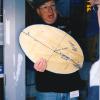Log, Aug 8, 2008
20 people. Oh the joys of trying to decide to open or not. Around 5PM, Francine called me (Les) asking how the weather was in Westerly. She lives upstate. "Fine", I say. "Well, it is raining here" she responded. I looked at the Weather channel and while there were scattered storms to the north, there was nothing to the south. So we decided to open. 45 minutes later, huge black clouds appeared in the sky, and the weather radar suddenly showed a really nasty cell with lots of yellow and red bearing down on the coastline. It started to rain. I called Francine. "Duhhh! It's raining here now, Francine. There is lots of thunder and lightning in the area". "Gee," she said "it just cleared up beautifully up here." We put up the Observatory Dome with the big question mark over the half opened image up on the website. We explained what was happening and said we'd make a final decision at the Observatory between 8 and 8:30. By 7:30, it cleared beautifully at Westerly. Yet another call to Francine. "I'm heading to the Observatory, some big clouds but it is dry here" I said. "Well it is raining upstate." She replied.I got to the Observatory to an absolutely spectacular sunset. This can be a bad sign depending on which way the clouds that form the sunset are heading. I got the scope up and running, and tried to view the Moon. It was almost obscured. A few people had arrived and we looked at a very drab image of the Moon. Someone said, there is a real bright star in the south east. Well, it wasn't a star but Jupiter and although it flirted with some clouds it's rapidly became brighter and clearer. We had some luck. The weather which was clear to the south was moving onshore. The night became quite clear with a fine Milky Way Galaxy, good Messier objects in Sagittarius and Scorpio in spite of the Moon which by now was bright and clear. Yet just before shutting down, we could see flashes in the distant south east that indicated yet another thunderstorm was drifting out to sea south of Long Island.I've been having a real hassle with computers this week. Something was wrong with my big laptop and my wife's medium size laptop was not very happy either. Now I am fairly fanatical about virus protection and what was happening wasn't like a virus. Turned out to be the "the software update from the infernal regions" which wasn't caught by our spy ware because the update "tah dah!" was to our spy ware. It wasn't a classic virus just bad programming. When my computer froze totally, I had to take it to the shop because I lacked the tools to get it to even boot from the CD-ROM. Finally, just before I had the series of calls to Francine, I got everything back and running. All my computers were up and running. Well, not quite so fast McGee - I had forgotten the beast in the Dome. Francine had had a few odd problems with last week. It came up OK, but it shut down hard after about 20 minutes. I couldn't make it boot no matter what. Grrrrrr! I pulled it out and stuffed it in the car. Well in the day light the answer was clear. I had a bug. Not a programming bug, but an honest to goodness ant that had crawled into the power plug and died. Plugging the computer in drained the battery completely. I finally fixed it this morning with a needle. It will be back on line next Friday.You might think we had a mediocre night but for the third week in a row, we really had a great time. The Moon was up most of the evening. So dim fuzzies were not on our schedule. We looked at some fascinating things in the South and Southeastern skies. The Perseids will be at their maximum on Tuesday but we had quite a few bright earlier ones after 10 PM. We also spied quite a number of high satellites.One thing we did which was rather interesting was sort of a "dirty trick" on Francine. I turned to one of the least frequently visited Messier objects - M24. There are a lot of reasons why this thing is not viewed very often. First of all, it isn't anything at all! It just happens to be where the densest part of the star fields is in the Milky Way Galaxy as seen from Earth. It is really beautiful with more stars than you can count in less than an hour in the eyepiece. What was interesting is when I placed the polarizing filter in the eyepiece and showed the same view at 5 magnitudes dimmer. Only a single star remained bright and a couple of other was borderline. This loss of 5 magnitudes is about the loss in contrast between Frosty Drew and Providence. If nothing else could prove what light pollution does, this was a dramatic example.-Les Coleman
- Author:
- Leslie Coleman
- Entry Date:
- Aug 8, 2008
- Published Under:
- Leslie Coleman's Log

